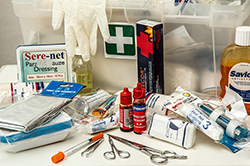 Safety at work depends on all employees doing their part. Sometimes, though, co-workers decide to cut corners, get in a hurry, feel distracted, or otherwise neglect safety protocols. A 2010 study by the RAD group found that only 40 percent of employees intervened when they noticed safety concerns because they feared that their co-worker would be defensive or angry or that intervening would not make a difference. While you may not want to be a whistleblower, you owe it to yourself, your co-workers, customers and clients, and the company to maintain safety. Here are the steps you can take when you notice co-workers acting in an unsafe manner.
Safety at work depends on all employees doing their part. Sometimes, though, co-workers decide to cut corners, get in a hurry, feel distracted, or otherwise neglect safety protocols. A 2010 study by the RAD group found that only 40 percent of employees intervened when they noticed safety concerns because they feared that their co-worker would be defensive or angry or that intervening would not make a difference. While you may not want to be a whistleblower, you owe it to yourself, your co-workers, customers and clients, and the company to maintain safety. Here are the steps you can take when you notice co-workers acting in an unsafe manner.
Identify and Solve the Inducing Factors
In general, safety violations occur for four reasons. Understanding why your co-workers violate safety standards can guide you in addressing the underlying issues.
1. Personal Perception – Co-workers may think they don’t need to follow safety precautions because their job is low-risk, the precautions are uncomfortable or they don’t have time. In this case, encourage your co-workers to maintain safety so they avoid injuries and model good behavior.
2. Mental Lapses – Forgetfulness, preoccupation or uncertainty may cause your co-workers to commit safety violations. A gentle reminder can correct the mistake.
3. Abilities – Your co-workers may act unsafely because they have improper tools, unrealistic expectations or other challenges. Offer insights into ways to overcome these safety risks.
4. Social Environment – Pressure to conform or fit in may prompt co-workers to neglect safety precautions. Encourage your co-workers to remain independent and do the right thing regardless of anyone else’s mindset.
Speak to the Offender in Private
When you see a co-worker breaking a safety procedure or otherwise acting unsafely, talk to that person in private. Approach your co-worker with kindness and understanding rather than accusations as you request that he or she maintains a safe work environment for the sake of everyone.
Notify Your Supervisor
If your co-worker refuses to listen to you and the unsafe behavior continues, talk with your supervisor. Share details such as the offender, dates, times, and incidents. The supervisor can then follow-up and schedule more frequent walkabouts, increase safety discussions or take other appropriate actions.
Practice Safety Procedures
Always model safety on the job site and do your part to maintain safe conditions. That means you must wear safety gear, pay attention to your surroundings and operate equipment properly.
You should also participate enthusiastically in safety meetings and encourage your co-workers to do the same. Take the presentation seriously as you promote a workplace culture that emphasizes safety.
Workplace safety protects everyone and reduces injuries and illnesses. Do your part and intervene if you notice safety violations.

 Power outages can occur during storms or because of accidents or blackouts. The next time you experience a power disruption, take these steps to protect your home, valuables and family.
Power outages can occur during storms or because of accidents or blackouts. The next time you experience a power disruption, take these steps to protect your home, valuables and family. To make extra money, look no further than your vehicle. Your car or truck can become a source of income even if you’re not behind the wheel.
To make extra money, look no further than your vehicle. Your car or truck can become a source of income even if you’re not behind the wheel. Long-term care (LTC) insurance ensures people with disabilities, chronic illnesses or other conditions receive the daily help they need. The coverage includes a variety of benefits, including equipment and home modifications. Understand the value of these specific benefits as you determine if LTC insurance is right for you or someone you love.
Long-term care (LTC) insurance ensures people with disabilities, chronic illnesses or other conditions receive the daily help they need. The coverage includes a variety of benefits, including equipment and home modifications. Understand the value of these specific benefits as you determine if LTC insurance is right for you or someone you love. One in 64 children is diagnosed with
One in 64 children is diagnosed with A rise in temperatures this month can signal spring fever in your office. Your human resources department staff can improve focus and keep everyone on task in several ways.
A rise in temperatures this month can signal spring fever in your office. Your human resources department staff can improve focus and keep everyone on task in several ways. You’re familiar with the physical health benefits your insurance provides, but you may not be familiar with your mental health benefits. These benefits address numerous mental and behavioral health challenges you may face, and you can use them in several ways.
You’re familiar with the physical health benefits your insurance provides, but you may not be familiar with your mental health benefits. These benefits address numerous mental and behavioral health challenges you may face, and you can use them in several ways. Your construction business requires a reliable vehicle. This spring, perform several maintenance procedures on your truck. Routine maintenance equips your truck to operate properly all season and prolongs the life of your vehicle.
Your construction business requires a reliable vehicle. This spring, perform several maintenance procedures on your truck. Routine maintenance equips your truck to operate properly all season and prolongs the life of your vehicle. Unpaid invoices wreak havoc with your construction business. When a client doesn’t pay, you can take these steps.
Unpaid invoices wreak havoc with your construction business. When a client doesn’t pay, you can take these steps. How many times do you walk by fire extinguishers without checking those tags or past first aid kits without peeking inside to assure the contents are complete?
How many times do you walk by fire extinguishers without checking those tags or past first aid kits without peeking inside to assure the contents are complete?



